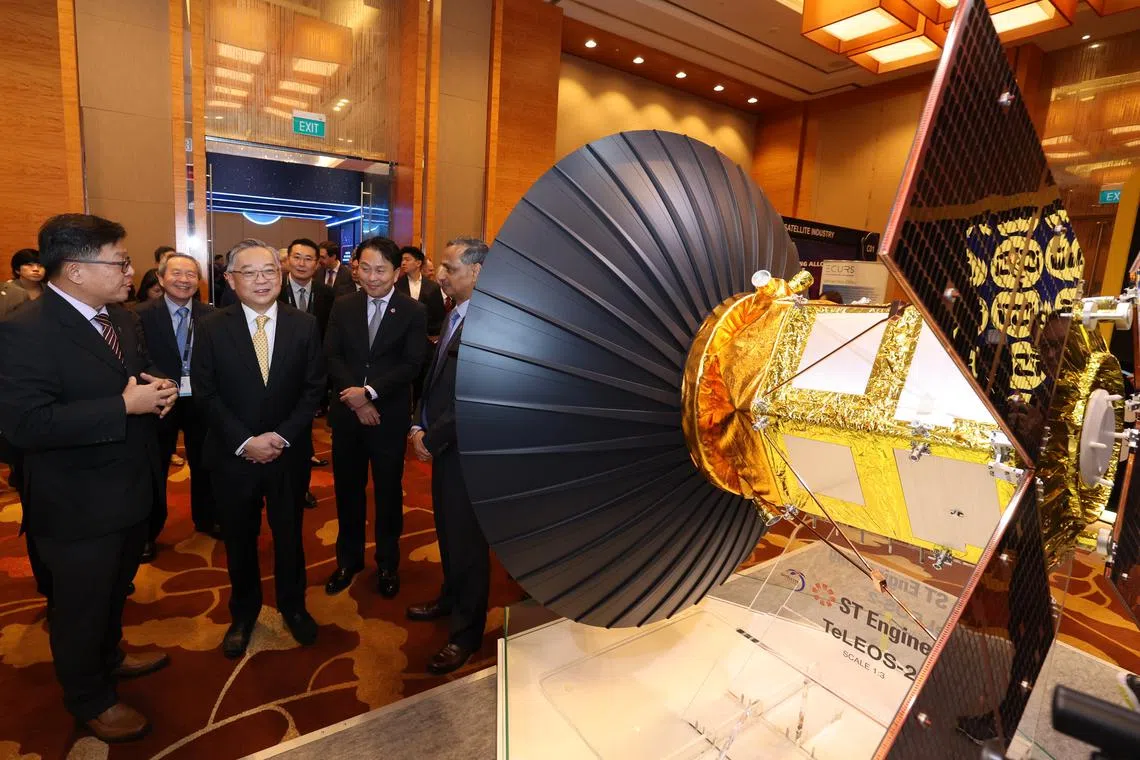$60m top-up to boost S’pore space tech research, bringing total committed to over $200m
Sign up now: Get ST's newsletters delivered to your inbox

Deputy Prime Minister and Minister for Trade and Industry Gan Kim Yong (in yellow tie) at the 17th Global Space Technology Convention and Exhibition on Feb 26.
PHOTO: LIANHE ZAOBAO
SINGAPORE - Singapore will invest an extra $60 million to boost its space tech industry and research ecosystem, which has in the past contributed to the development of space-based robotic arms and precision agriculture technologies.
The top-up will be invested over the next two years in the Space Technology Development Programme (STDP), launched in 2022 by the Office for Space Technology and Industry (OSTIn) and the National Research Foundation.
This expands the total amount of government funding in the programme to over $200 million, following an initial investment of $150 million three years ago.
The fresh funds are expected to accelerate innovation in satellite technology. They will also build capabilities in space tech among Singapore’s higher education and research institutions and promote the commercialisation of research.
A total of 14 space-related technology patents have been filed to date by entities in Singapore with the support of the STDP, said Deputy Prime Minister Gan Kim Yong on Feb 26.
While there are no details about the patents, past supported projects include a space-based robotic manipulator led by the Singapore Institute of Technology and the National University of Singapore (NUS) as well as a precision agriculture initiative by ST Engineering Geo-Insights and NUS.
Noting Singapore’s interest in the connectivity-related use cases of space tech, DPM Gan said that space-based communications can provide near real-time visibility of vessel movements.
“This will enable us to optimise our port operations for greater efficiency and enhance our sense-making and response in the event of an incident which may happen any time, anywhere,” he said. “This will also help ships to better plan their navigational paths and therefore reduce carbon emission.”
DPM Gan was speaking at the 17th Global Space Technology Convention and Exhibition held at the Sands Expo and Convention Centre. The event, which runs till Feb 27, is organised by Singapore Space and Technology Limited – a non-government organisation that runs a space accelerator programme with Enterprise Singapore.

The fresh funds are expected to accelerate innovation in satellite technology.
PHOTO: LIANHE ZAOBAO
Space-based Very High Frequency voice communications can provide more comprehensive coverage for pilots and air traffic controllers over remote areas, DPM Gan said, adding: “This will enhance the safety and efficiency of air traffic management.”
He also said Singapore is home to 70 space companies, including the regional headquarters of most of the world’s top 10 satellite service providers.
They are engaged in a wide range of activities across the value chain, from designing and manufacturing space components to providing satellite-based services, and include home-grown satellite communications company Addvalue Technologies as well as rocket propulsion and space launch start-up Equatorial Space Systems.
“We have a vibrant space research ecosystem, comprising research centres for satellite engineering and remote sensing,” said DPM Gan, adding that the sector alone has 2,000 professionals in engineering, research and business roles.
The additional $60 million in funding comes amid an expanding global space economy that is expected to triple in size and reach US$1.8 trillion (S$2.4 trillion) by 2035, according to data by the World Economic Forum.
OSTin said Singapore is “well placed” to capture economic value in the space sector due to its status as a leading global hub for industries including aerospace, microelectronics and precision engineering.
Also on Feb 26, OSTin signed a memorandum of understanding with the United Nations Office for Outer Space Affairs to share satellite data and embark on joint research projects with the World Bank, the World Economic Forum and the Mekong River Commission Secretariat.

Singapore is home to 70 space companies, including the regional headquarters of most of the world’s top 10 satellite service providers.
PHOTO: LIANHE ZAOBAO
DPM Gan said that while Singapore contributes less than 1 per cent of global emissions, it will inevitably be impacted by the effects of climate change globally, such as rising sea levels and temperatures.
“We must do our part to facilitate the global transition to a low-carbon future,” he said.
On the same day, OSTin launched the Earth Observation Initiative, which aims to use satellite technology to analyse and solve sustainability and humanitarian challenges in the Asia-Pacific region. These include food and water quality control and disaster and disease monitoring as well as forestry and land management.
Singapore will also strengthen its network of bilateral partnerships to advance opportunities in space, said the minister. He noted that Singapore has been a member of the United Nations Committee on the Peaceful Uses of Outer Space since 2019 as well as a signatory of the Artemis Accords since 2022.
“Through these platforms, we work with like-minded partners to shape the international framework on space activities – this will become even more critical as the number of space objects and activities grow exponentially in the years ahead,” DPM Gan said.
Also on Feb 26, OSTin signed a letter of intent with the European Space Agency to explore new business opportunities for Singaporean and European companies in the global space industry.
OSTin is also in discussion with the Indian National Space Promotion and Authorisation Centre to expand cooperation in space tech and industry development.
Established in 2013 to promote the sector, OSTin helps local businesses develop internationally competitive capabilities and international companies establish their headquarters here.
One beneficiary is Transcelestial, a wireless laser communications start-up based in Singapore, which is now working with ST Engineering Satellite Systems in satellite design and manufacturing.
Another company is Unseenlabs, a French company specialising in space-based radio frequency detection for maritime use. On Feb 26, it announced its Singapore office, its first outside of France.



